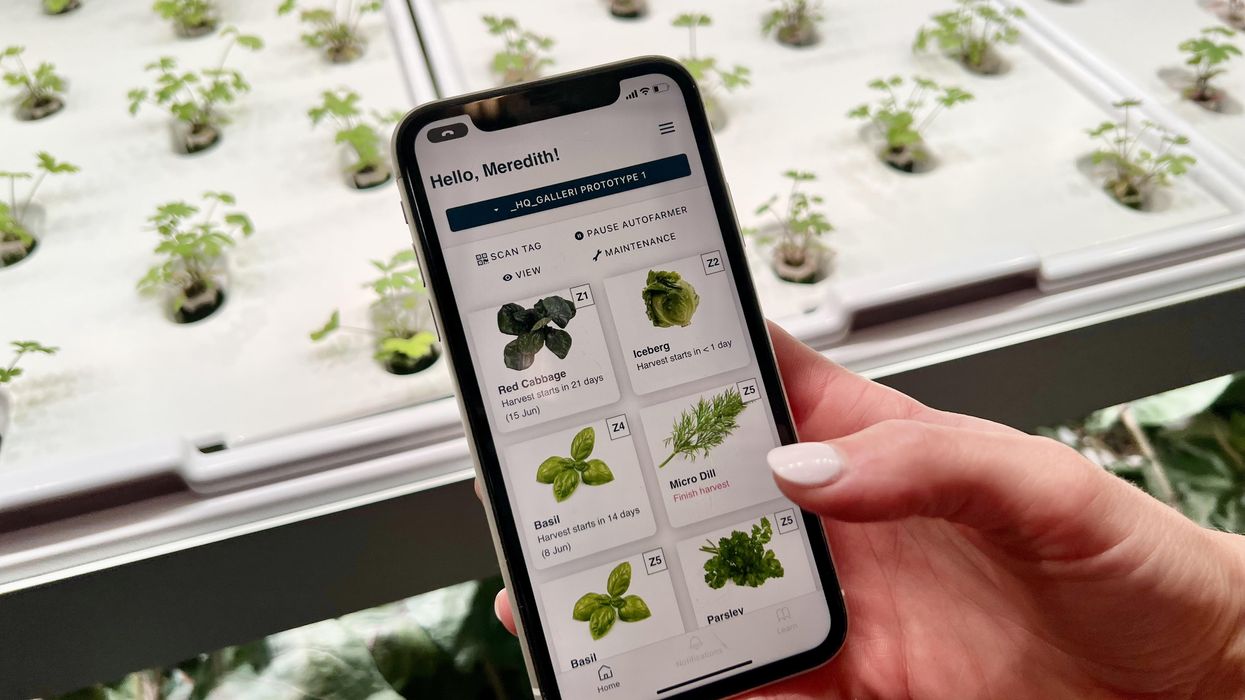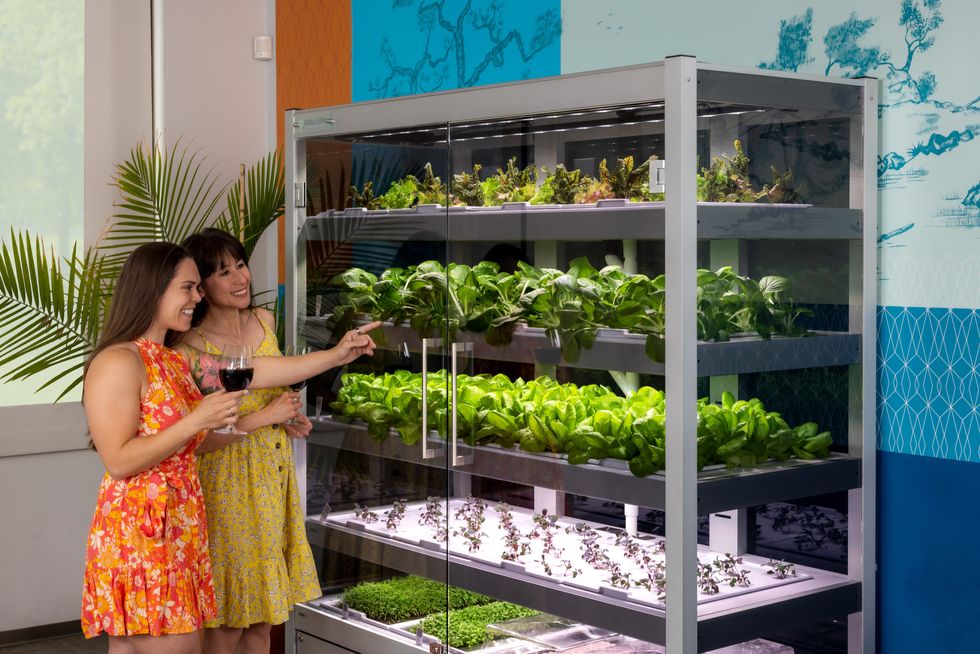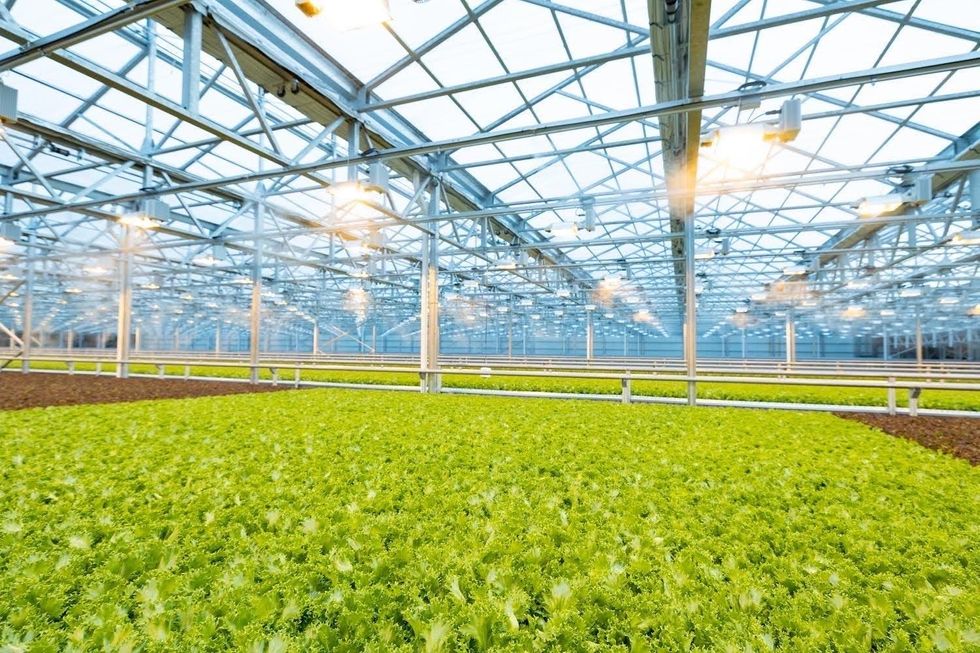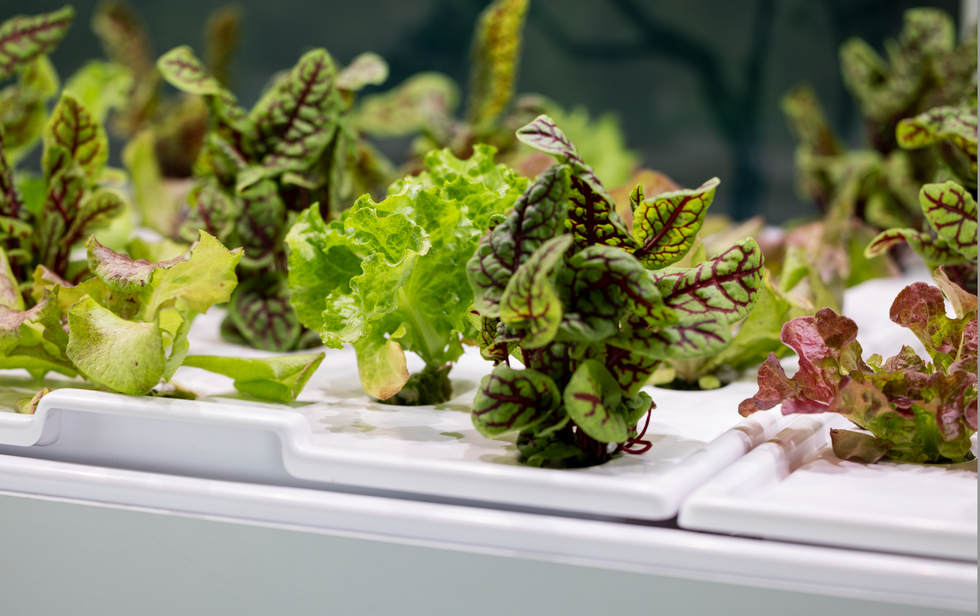Autonomous, indoor farming gives a boost to crops

Artificial Intelligence is already helping to grow some of the food we eat.
The glass-encased cabinet looks like a display meant to hold reasonably priced watches, or drugstore beauty creams shipped from France. But instead of this stagnant merchandise, each of its five shelves is overgrown with leaves — moss-soft pea sprouts, spikes of Lolla rosa lettuces, pale bok choy, dark kale, purple basil or red-veined sorrel or green wisps of dill. The glass structure isn’t a cabinet, but rather a “micro farm.”
The gadget is on display at the Richmond, Virginia headquarters of Babylon Micro-Farms, a company that aims to make indoor farming in the U.S. more accessible and sustainable. Babylon’s soilless hydroponic growing system, which feeds plants via nutrient-enriched water, allows chefs on cruise ships, cafeterias and elsewhere to provide home-grown produce to patrons, just seconds after it’s harvested. Currently, there are over 200 functioning systems, either sold or leased to customers, and more of them are on the way.
The chef-farmers choose from among 45 types of herb and leafy-greens seeds, plop them into grow trays, and a few weeks later they pick and serve. While success is predicated on at least a small amount of these humans’ care, the systems are autonomously surveilled round-the-clock from Babylon’s base of operations. And artificial intelligence is helping to run the show.
Babylon piloted the use of specialized cameras that take pictures in different spectrums to gather some less-obvious visual data about plants’ wellbeing and alert people if something seems off.
Imagine consistently perfect greens and tomatoes and strawberries, grown hyper-locally, using less water, without chemicals or environmental contaminants. This is the hefty promise of controlled environment agriculture (CEA) — basically, indoor farms that can be hydroponic, aeroponic (plant roots are suspended and fed through misting), or aquaponic (where fish play a role in fertilizing vegetables). But whether they grow 4,160 leafy-green servings per year, like one Babylon farm, or millions of servings, like some of the large, centralized facilities starting to supply supermarkets across the U.S., they seek to minimize failure as much as possible.

Babylon’s soilless hydroponic growing system
Courtesy Babylon Micro-Farms
Here, AI is starting to play a pivotal role. CEA growers use it to help “make sense of what’s happening” to the plants in their care, says Scott Lowman, vice president of applied research at the Institute for Advanced Learning and Research (IALR) in Virginia, a state that’s investing heavily in CEA companies. And although these companies say they’re not aiming for a future with zero human employees, AI is certainly poised to take a lot of human farming intervention out of the equation — for better and worse.
Most of these companies are compiling their own data sets to identify anything that might block the success of their systems. Babylon had already integrated sensor data into its farms to measure heat and humidity, the nutrient content of water, and the amount of light plants receive. Last year, they got a National Science Foundation grant that allowed them to pilot the use of specialized cameras that take pictures in different spectrums to gather some less-obvious visual data about plants’ wellbeing and alert people if something seems off. “Will this plant be healthy tomorrow? Are there things…that the human eye can't see that the plant starts expressing?” says Amandeep Ratte, the company’s head of data science. “If our system can say, Hey, this plant is unhealthy, we can reach out to [users] preemptively about what they’re doing wrong, or is there a disease at the farm?” Ratte says. The earlier the better, to avoid crop failures.

Natural light accounts for 70 percent of Greenswell Growers’ energy use on a sunny day.
Courtesy Greenswell Growers
IALR’s Lowman says that other CEA companies are developing their AI systems to account for the different crops they grow — lettuces come in all shapes and sizes, after all, and each has different growing needs than, for example, tomatoes. The ways they run their operations differs also. Babylon is unusual in its decentralized structure. But centralized growing systems with one main location have variabilities, too. AeroFarms, which recently declared bankruptcy but will continue to run its 140,000-square foot vertical operation in Danville, Virginia, is entirely enclosed and reliant on the intense violet glow of grow lights to produce microgreens.
Different companies have different data needs. What data is essential to AeroFarms isn’t quite the same as for Greenswell Growers located in Goochland County, Virginia. Raising four kinds of lettuce in a 77,000-square-foot automated hydroponic greenhouse, the vagaries of naturally available light, which accounts for 70 percent of Greenswell’s energy use on a sunny day, affect operations. Their tech needs to account for “outside weather impacts,” says president Carl Gupton. “What adjustments do we have to make inside of the greenhouse to offset what's going on outside environmentally, to give that plant optimal conditions? When it's 85 percent humidity outside, the system needs to do X, Y and Z to get the conditions that we want inside.”
AI will help identify diseases, as well as when a plant is thirsty or overly hydrated, when it needs more or less calcium, phosphorous, nitrogen.
Nevertheless, every CEA system has the same core needs — consistent yield of high quality crops to keep up year-round supply to customers. Additionally, “Everybody’s got the same set of problems,” Gupton says. Pests may come into a facility with seeds. A disease called pythium, one of the most common in CEA, can damage plant roots. “Then you have root disease pressures that can also come internally — a change in [growing] substrate can change the way the plant performs,” Gupton says.
AI will help identify diseases, as well as when a plant is thirsty or overly hydrated, when it needs more or less calcium, phosphorous, nitrogen. So, while companies amass their own hyper-specific data sets, Lowman foresees a time within the next decade “when there will be some type of [open-source] database that has the most common types of plant stress identified” that growers will be able to tap into. Such databases will “create a community and move the science forward,” says Lowman.
In fact, IALR is working on assembling images for just such a database now. On so-called “smart tables” inside an Institute lab, a team is growing greens and subjects them to various stressors. Then, they’re administering treatments while taking images of every plant every 15 minutes, says Lowman. Some experiments generate 80,000 images; the challenge lies in analyzing and annotating the vast trove of them, marking each one to reflect outcome—for example increasing the phosphate delivery and the plant’s response to it. Eventually, they’ll be fed into AI systems to help them learn.
For all the enthusiasm surrounding this technology, it’s not without downsides. Training just one AI system can emit over 250,000 pounds of carbon dioxide, according to MIT Technology Review. AI could also be used “to enhance environmental benefit for CEA and optimize [its] energy consumption,” says Rozita Dara, a computer science professor at the University of Guelph in Canada, specializing in AI and data governance, “but we first need to collect data to measure [it].”

The chef-farmers can choose from 45 types of herb and leafy-greens seeds.
Courtesy Babylon Micro-Farms
Any system connected to the Internet of Things is also vulnerable to hacking; if CEA grows to the point where “there are many of these similar farms, and you're depending on feeding a population based on those, it would be quite scary,” Dara says. And there are privacy concerns, too, in systems where imaging is happening constantly. It’s partly for this reason, says Babylon’s Ratte, that the company’s in-farm cameras all “face down into the trays, so the only thing [visible] is pictures of plants.”
Tweaks to improve AI for CEA are happening all the time. Greenswell made its first harvest in 2022 and now has annual data points they can use to start making more intelligent choices about how to feed, water, and supply light to plants, says Gupton. Ratte says he’s confident Babylon’s system can already “get our customers reliable harvests. But in terms of how far we have to go, it's a different problem,” he says. For example, if AI could detect whether the farm is mostly empty—meaning the farm’s user hasn’t planted a new crop of greens—it can alert Babylon to check “what's going on with engagement with this user?” Ratte says. “Do they need more training? Did the main person responsible for the farm quit?”
Lowman says more automation is coming, offering greater ability for systems to identify problems and mitigate them on the spot. “We still have to develop datasets that are specific, so you can have a very clear control plan, [because] artificial intelligence is only as smart as what we tell it, and in plant science, there's so much variation,” he says. He believes AI’s next level will be “looking at those first early days of plant growth: when the seed germinates, how fast it germinates, what it looks like when it germinates.” Imaging all that and pairing it with AI, “can be a really powerful tool, for sure.”
The upcoming vaccine is changing the way we look at treating one of the country’s deadliest cancers.
Last week, researchers at the University of Oxford announced that they have received funding to create a brand new way of preventing ovarian cancer: A vaccine. The vaccine, known as OvarianVax, will teach the immune system to recognize and destroy mutated cells—one of the earliest indicators of ovarian cancer.
Understanding Ovarian Cancer
Despite advancements in medical research and treatment protocols over the last few decades, ovarian cancer still poses a significant threat to women’s health. In the United States alone, more than 12,0000 women die of ovarian cancer each year, and only about half of women diagnosed with ovarian cancer survive five or more years past diagnosis. Unlike cervical cancer, there is no routine screening for ovarian cancer, so it often goes undetected until it has reached advanced stages. Additionally, the primary symptoms of ovarian cancer—frequent urination, bloating, loss of appetite, and abdominal pain—can often be mistaken for other non-cancerous conditions, delaying treatment.
An American woman has roughly a one percent chance of developing ovarian cancer throughout her lifetime. However, these odds increase significantly if she has inherited mutations in the BRCA1 or BRCA2 genes. Women who carry these mutations face a 46% lifetime risk for ovarian and breast cancers.
An Unlikely Solution
To address this escalating health concern, the organization Cancer Research UK has invested £600,000 over the next three years in research aimed at creating a vaccine, which would destroy cancerous cells before they have a chance to develop any further.
Researchers at the University of Oxford are at the forefront of this initiative. With funding from Cancer Research UK, scientists will use tissue samples from the ovaries and fallopian tubes of patients currently battling ovarian cancer. Using these samples, University of Oxford scientists will create a vaccine to recognize certain proteins on the surface of ovarian cancer cells known as tumor-associated antigens. The vaccine will then train that person’s immune system to recognize the cancer markers and destroy them.
The next step
Once developed, the vaccine will first be tested in patients with the disease, to see if their ovarian tumors will shrink or disappear. Then, the vaccine will be tested in women with the BRCA1 or BRCA2 mutations as well as women in the general population without genetic mutations, to see whether the vaccine can prevent the cancer altogether.
While the vaccine still has “a long way to go,” according to Professor Ahmed Ahmed, Director of Oxford University’s ovarian cancer cell laboratory, he is “optimistic” about the results.
“We need better strategies to prevent ovarian cancer,” said Ahmed in a press release from the University of Oxford. “Currently, women with BRCA1/2 mutations are offered surgery which prevents cancer but robs them of the chance to have children afterward.
Teaching the immune system to recognize the very early signs of cancer is a tough challenge. But we now have highly sophisticated tools which give us real insights into how the immune system recognizes ovarian cancer. OvarianVax could offer the solution.”
How sharing, hearing, and remembering positive stories can help shape our brains for the better
Across cultures and through millennia, human beings have always told stories. Whether it’s a group of boy scouts around a campfire sharing ghost stories or the paleolithic Cro-Magnons etching pictures of bison on cave walls, researchers believe that storytelling has been universal to human beings since the development of language.
But storytelling was more than just a way for our ancestors to pass the time. Researchers believe that storytelling served an important evolutionary purpose, helping humans learn empathy, share important information (such as where predators were or what berries were safe to eat), as well as strengthen social bonds. Quite literally, storytelling has made it possible for the human race to survive.
Today, neuroscientists are discovering that storytelling is just as important now as it was millions of years ago. Particularly in sharing positive stories, humans can more easily form relational bonds, develop a more flexible perspective, and actually grow new brain circuitry that helps us survive. Here’s how.
How sharing stories positively impacts the brain
When human beings share stories, it increases the levels of certain neurochemicals in the brain, neuroscientists have found. In a 2021 study published in Proceedings of the National Academy of Sciences (PNAS), Swedish researchers found that simply hearing a story could make hospitalized children feel better, compared to other hospitalized children who played a riddle game for the same amount of time. In their research, children in the intensive care unit who heard stories for just 30 minutes had higher levels of oxytocin, a hormone that promotes positive feelings and is linked to relaxation, trust, social connectedness, and overall psychological stability. Furthermore, the same children showed lower levels of cortisol, a hormone associated with stress. Afterward, the group of children who heard stories tended to describe their hospital experiences more positively, and even reported lower levels of pain.
Annie Brewster, MD, knows the positive effect of storytelling from personal experience. An assistant professor at Harvard Medical School and the author of The Healing Power of Storytelling: Using Personal Narrative to Navigate Illness, Trauma, and Loss, Brewster started sharing her personal experience with chronic illness after being diagnosed with multiple sclerosis in 2001. In doing so, Brewster says it has enabled her to accept her diagnosis and integrate it into her identity. Brewster believes so much in the power of hearing and sharing stories that in 2013 she founded Health Story Collaborative, a forum for others to share their mental and physical health challenges.“I wanted to hear stories of people who had found ways to move forward in positive ways, in spite of health challenges,” Brewster said. In doing so, Brewster believes people with chronic conditions can “move closer to self-acceptance and self-love.”
While hearing and sharing positive stories has been shown to increase oxytocin and other “feel good” chemicals, simply remembering a positive story has an effect on our brains as well. Mark Hoelterhoff, PhD, a lecturer in clinical psychology at the University of Edinburgh, recalling and “savoring” a positive story, thought, or feedback “begins to create new brain circuitry—a new neural network that’s geared toward looking for the positive,” he says. Over time, other research shows, savoring positive stories or thoughts can literally change the shape of your brain, hard-wiring someone to see things in a more positive light.How stories can change your behavior
In 2009, Paul Zak, PhD, a neuroscientist and professor at Claremont Graduate University, set out to measure how storytelling can actually change human behavior for the better. In his study, Zak wanted to measure the behavioral effects of oxytocin, and did this by showing test subjects two short video clips designed to elicit an emotional response.
In the first video they showed the study participants, a father spoke to the camera about his two-year-old son, Ben, who had been diagnosed with terminal brain cancer. The father told the audience that he struggled to connect with and enjoy Ben, as Ben had only a few months left to live. In the end, the father finds the strength to stay emotionally connected to his son until he dies.
The second video clip, however, was much less emotional. In that clip, the same father and son are shown spending the day at the zoo. Ben is only suggested to have cancer (he is bald from chemotherapy and referred to as a ‘miracle’, but the cancer isn’t mentioned directly). The second story lacked the dramatic narrative arc of the first video.
Zak’s team took blood before and after the participants watched one of the two videos and found that the first story increased the viewers’ cortisol and oxytocin, suggesting that they felt distress over the boy’s diagnosis and empathy toward the boy and his father. The second narrative, however, didn’t increase oxytocin or cortisol at all.
But Zak took the experiment a step further. After the movie clips, his team gave the study participants a chance to share money with a stranger in the lab. The participants who had an increase in cortisol and oxytocin were more likely to donate money generously. The participants who had increased cortisol and oxytocin were also more likely to donate money to a charity that works with children who are ill. Zak also found that the amount of oxytocin that was released was correlated with how much money people felt comfortable giving—in other words, the more oxytocin that was released, the more generous they felt, and the more money they donated.
How storytelling strengthens our bond with others
Sharing, hearing, and remembering stories can be a powerful tool for social change–not only in the way it changes our brain and our behavior, but also because it can positively affect our relationships with other people
Emotional stimulation from telling stories, writes Zak, is the foundation for empathy, and empathy strengthens our relationships with other people. “By knowing someone’s story—where they come from, what they do, and who you might know in common—relationships with strangers are formed.”
But why are these relationships important for humanity? Because human beings can use storytelling to build empathy and form relationships, it enables them to “engage in the kinds of large-scale cooperation that builds massive bridges and sends humans into space,” says Zak.
Storytelling, Zak found, and the oxytocin release that follows, also makes people more sensitive to social cues. This sensitivity not only motivates us to form relationships, but also to engage with other people and offer help, particularly if the other person seems to need help.
But as Zak found in his experiments, the type of storytelling matters when it comes to affecting relationships. Where Zak found that storytelling with a dramatic arc helps release oxytocin and cortisol, enabling people to feel more empathic and generous, other researchers have found that sharing happy stories allows for greater closeness between individuals and speakers. A group of Chinese researchers found that, compared to emotionally-neutral stories, happy stories were more “emotionally contagious.” Test subjects who heard happy stories had greater activation in certain areas of their brains, experienced more significant, positive changes in their mood, and felt a greater sense of closeness between themselves and the speaker.
“This finding suggests that when individuals are happy, they become less self-focused and then feel more intimate with others,” the authors of the study wrote. “Therefore, sharing happiness could strengthen interpersonal bonding.” The researchers went on to say that this could lead to developing better social networks, receiving more social support, and leading more successful social lives.
Since the start of the COVID pandemic, social isolation, loneliness, and resulting mental health issues have only gotten worse. In light of this, it’s safe to say that hearing, sharing, and remembering stories isn’t just something we can do for entertainment. Storytelling has always been central to the human experience, and now more than ever it’s become something crucial for our survival.
Want to know how you can reap the benefits of hearing happy stories? Keep an eye out for Upworthy’s first book, GOOD PEOPLE: Stories from the Best of Humanity, published by National Geographic/Disney, available on September 3, 2024. GOOD PEOPLE is a much-needed trove of life-affirming stories told straight from the heart. Handpicked from Upworthy’s community, these 101 stories speak to the breadth, depth, and beauty of the human experience, reminding us we have a lot more in common than we realize.

